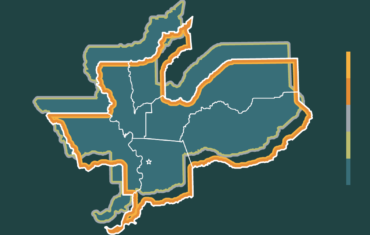2021: A Time for Courageous Action

January is often when we make predictions for what is to come in the new year. But, if 2020 taught us anything, it is that we are living in an unpredictable world. And given the tumultuous start to 2021, it is likely we won’t be sailing through smooth waters.
With upcoming transfers of leadership, still-record-breaking COVID-19 infection rates, an aggressive national vaccine roll out needed, and with economic recovery and the need for climate resilience at the forefront, we know the 2021 waters will be choppy. Throughout 2020 we talked about the need to reimagine systems that are resilient and equitable. Without courage to take on hard things and focus on tackling complex problems together, we will come out the other side of the pandemic only to recreate inequitable systems that don’t meet the needs of all and can’t adapt to rapid changes that occur in our modern world. Here are some foundational questions and bold ideas from outside our region to inspire us in 2021.
Economic Insecurity
Almost a year into the pandemic, our nation has lost tens of millions of jobs and while there will likely be additional support for small businesses with a new administration, economists have braced us for a slow recovery. Further, with rapidly accelerating changes to our economy and workplaces, many of the lost jobs may be gone permanently. We must push forward innovative and equitable solutions to help people re-enter the labor market. How do we address the dual challenge of the pandemic’s impacts on the economy and the rapidly changing and digitizing workforce? The Aspen Institute has launched a partnership with Mastercard Center for Inclusive Growth to modernize the structure of worker benefits. The program, Benefits21, reimagines a 21st century worker benefits system that provides financial security to all, with a focus on inclusive, portable, people-centric, and interoperable benefits, including unemployment insurance, paid leave, training, and retirement. Additionally, mayors from around the nation are exploring how Universal Basic Income could be a part of a solution to pandemic response and economic insecurity in their communities. Finally, close to home, the Stanislaus Cradle to Career Partnership drives a highly collaborative and robust campaign approach to align institutions to ensure that every child has a path, plan, and a purpose.
Racial Equity
2020 laid bare long term racial inequities and generated an increased sense of urgency to act. How do we move forward with racial equity as a central and driving force in community initiatives? The California Strategic Growth Council is working in collaboration with the Public Health Institute to support the Capitol Collaborative on Race & Equity (CCORE) – a racial equity capacity-building program for California State employees. The program offers cohorts for participants to receive training to learn about, plan for, and implement activities that embed racial equity approaches into institutional culture, policies, and practices. McKinsey offered a data report looking at the role of coalitions in advancing racial equity and W.K. Kellogg Foundation in partnership with Lever for Change is seeking proposals to close the racial equity gap so all children, families and communities can be more confident, healthier and secure in their trust of the systems and institutions that serve them. Registration is due January 28th.
Digital Divide
2020 also made clear the necessity of digital access for all. Over 20 million people across the U.S. lack broadband access- yet connectivity is required for education, jobs, and basic services. How do we rapidly transition infrastructure and services to reflect an economy that requires full digital access? The City of San José, in partnership with the City of San José Mayor’s Office of Technology and Innovation, has engaged the California Emerging Technology Fund to establish the Digital Inclusion Partnership, a $24 million cross-sector fund that will be distributed in grant awards over a ten-year period. It is the city’s largest philanthropic effort in recent history and aims to provide universal connectivity and appropriate digital skills to 50,000 households. This robust effort is a public private partnership and in its first round of rounding will disperse $1M to organizations in San José who are closing the Digital Divide through expanding device access and digital literacy skills.
Housing and Homelessness
Homelessness continues to rise, with a new report from L.A. projecting homelessness doubling by 2023. Additionally, housing affordability challenges have only worsened in 2020 as income loss has occurred and while evictions were avoided, the weight of accumulated rent payments will hit many in 2021. What are the solutions that will help us launch and scale efforts to address housing affordability and homelessness? In Portland, Oregon, Mercy Corps created the Community Investment Trust (CIT) creating a fund that builds the possibility to strengthen communities and create empowered lives. The CIT offers a long-term path to collective, communal ownership of real-estate for investors starting from $10-$100 per month. In Vancouver, the charity Foundations for Social Change (FSC), in partnership with the University of British Columbia gave individuals experiencing homelessness $5,800 with no strings attached and saw very positive outcomes including the attainment of stable, long term housing and food security.
Climate Change
Another aspect of 2020 has been the opportunity to decrease commuting and spend more time in nature for many. Further, COVID-19 response has showed us that we can have the will to move quickly to enact policies and practices for the good of public health. How will we take the lessons of pandemic response and translate them into gains in climate response and resilience? Many cities are taking rapid approaches to increase active transportation, addressing climate change and responding to increased demand for safe walking and biking infrastructure. Paris has demonstrated that cities can go green fast and enact changes that go beyond the pandemic, and Stay Healthy Streets Seattle shows ways that bike lanes are being utilized in ways that improve health and environment.
Addressing these foundational questions for 2021 and learning about initiatives from outside our region inspires us to think differently, take action in new ways, build new types of partnerships, and advance bold solution sets about complex community problems.
Valley Vision supports livable communities in the Capital region by advancing economic prosperity, social equity, and environmental sustainability. We use actionable research, policy education and advocacy, collaboration, and program activation to advance our work. Some key priorities in 2021 will be: enacting a regional agenda for digital inclusion, supporting inclusive economic recovery and growth through Our Path Forward: The Prosperity Strategy, advancing climate resilience, and supporting decision-making with actionable research. Our next Vantage Point will include a focus on inspiring action being taken within our region – there have been a significant amount of that too!
What inspires you for 2021? Let us act courageously together to advance equity, prosperity, and sustainability in our region and in our communities.
To keep up with Valley Vision’s work to advance livability in the Sacramento region, subscribe to our Vantage Point email newsletter!
Evan Schmidt is Valley Vision’s Chief Executive Officer.




